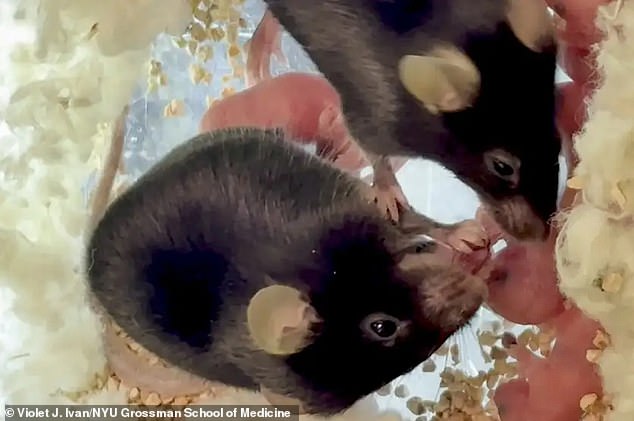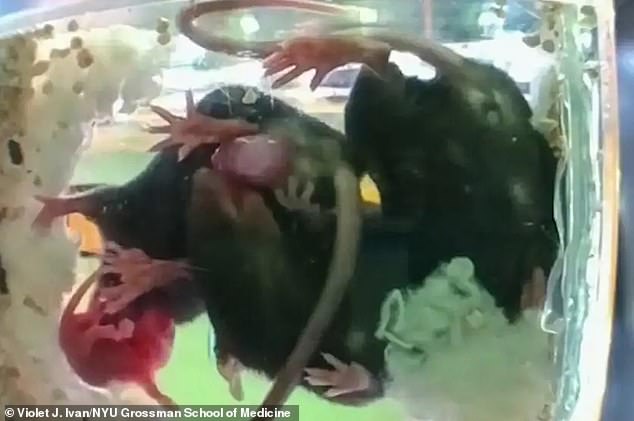Most women can’t imagine giving birth without the help of a midwife or doula – and it turns out mice are the same.
Researchers have discovered that rodents step in if they notice a pregnant friend getting into difficulty during birth.
As part of a study, they genetically engineered pregnant mice to lack a hormone crucial for triggering contractions that help to push babies out of the birth canal.
Without these strong contractions, the pups are likely to get stuck and die and the mothers often won’t survive either.
A total of 17 pregnant mice were placed into individual cages – some by themselves and some with an experienced female ‘companion’ who had previously given birth.
Analysis revealed that the experienced mouse mothers assisted their pregnant friends when their pups became stuck – using their mouth or paws to extract them before cleaning the newborns up.
This drastically increased survival chances from nearly zero for both mother and pup in the ‘no assistance’ group to 90 per cent of the midwife group, New Scientist reports.
The occurrence is thought to be the first documented sighting of this kind of assistance in animals that aren’t primates.

Experienced mouse ‘midwives’ used their paws and mouths to help extract stuck pups before helping to clean them up

Here, an assistant mouse can be seen gently pulling a stuck pup. The researchers said their findings suggest caregiving may be more common among the species than previously thought
‘She will come over and act like a little mouse midwife and very carefully, with her mouth and her paws, pull the pup out,’ Professor Robert Froemke, from NYU Langone Health, told the annual meeting of the Society for Neuroscience in San Diego, California.
‘There are a lot of reasons mammals are social, and a primary reason is to help each other out, especially in these really vulnerable periods.
‘Even mice struggle with childbirth and childcare, like we do, and can help others out so it isn’t traumatic, maybe kind of like we do.’
To take the study further, the team tested whether it made any different if the ‘midwife’ mouse had previously given birth.
They repeated the experiment and instead of mouse mothers, they paired the pregnant females with male mice or female mice who had never given birth.
Across both groups, 50–60 per cent of the mouse mothers survived giving birth – but none of the pups did.
While the ‘assistant’ mice applied abdominal pressure, helping the pregnant mice give birth, none knew to break open the fluid–filled sacs encasing the newborns – a vital step to allow them to breathe.
‘It seems the experience of being a mother is required to be a successful [mouse] midwife,’ Professor Froemke said.
The conference abstract reads: ‘Our findings underscore the critical role of experienced maternal support in childbirth, highlighting the significant benefits of midwife–like behaviours for maternal and offspring survival during dystocia (difficult) or extended labour.’
The findings – along with previous observations that mice give first aid – indicate that caregiving may be more common among the species than previously thought, the team said.
An incredible video, released earlier this year, showed rodents instinctively rushing to help an unconscious companion.
In adorable lab footage, one of the rodents opens an unconscious partner’s mouth and pulls its tongue aside to clear its airway.
Overall, helpful actions including sniffing and grooming, licking of the head, and tongue pulling were shown to ‘accelerate recovery from unconsciousness’.

